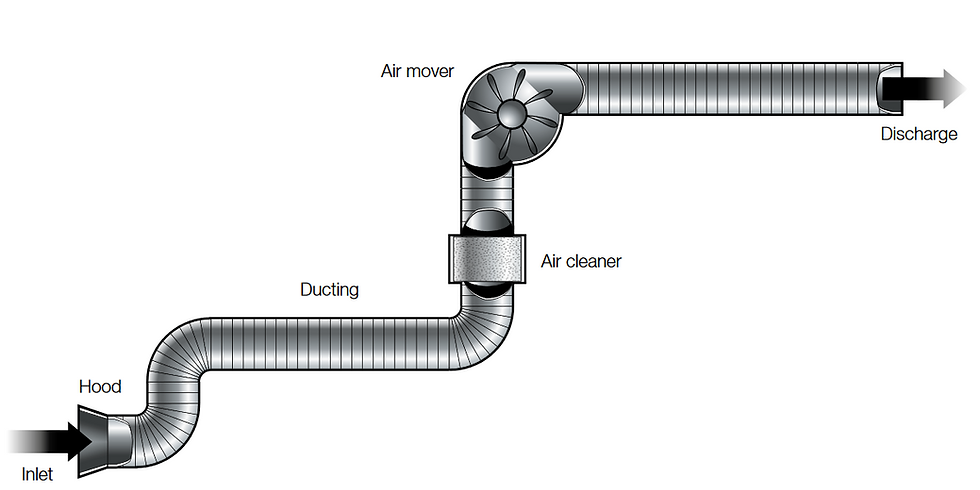What is the iCue™ Connected Filtration Service?
- Jan 18, 2021
- 3 min read
Updated: Apr 7, 2021

The iCue™ connected filtration service monitors dust collectors, using industrial IoT technology. The solution tracks dust collector status and alerts you when normal thresholds are breached; stores and exports historical data to help identify machine problems and optimize performance; and automates data capture for compliance reporting.
How Does It Work?
The iCue™ service is comprised of four key components that work together to deliver a comprehensive set of benefits:
Sensor-integrated gateway: Captures data from the collector and sends it to Donaldson’s secure cloud, where it turns the data into actionable insights.
Online dashboard: Shows equipment status in near real-time, as well as historical trend data for each connected collector.
Alarms and notifications: Alerts you when immediate maintenance actions may be required, based on deviations from pre-set parameters.
Weekly status report: Provides condition summaries of all connected dust collectors across your operation.
How Will It Make The Job Easier?
Continuous monitoring with the iCue™ service has three advantages:
It can help you identify and trouble-shoot issues before they escalate into disruptive downtime;
It promotes timely maintenance, such as changing filters, which can improve equipment performance and help control costs;
It saves time by reducing visual inspections and manual instrument readings.
Does It Control The Dust Collector?
No, the iCue™ service is “read-only” and does not control any functions on your collector. It operates independently of your local control network (SCADA or DCS), so it does not compromise the security of control systems or internal data.
What Functions In A Dust Collector Does The iCue™ Service Monitor?
Issues in dust collectors are generally related to several key functions. The iCue™ service monitors these functions with dedicated sensors. Here are the standard sensors that are part of every installation:
Relative airflow – Tracks changes in airflow through the collector and alerts you if it deviates too high or too low from the collector’s designed flow.
Differential pressure across the filters – Enables you to track the life of filters and optimize filter change intervals. Sudden increases or decreases in differential pressure can also alert you to conditions such as filter tears.
Compressed air – Tells you whether compressed air is at the right level for self-cleaning. You are alerted if pressure is too low to clean properly, too high, which can cause filter damage, or inadvertently left off when the collector is started back up for a duty cycle.
A fourth sensor tracks the temperature inside the wireless internet gateway device to ensure proper performance.
Are There Any Optional Sensors For The iCue™ Service?
Yes, the following additional sensors are available if your operation would benefit from them:
Particulate trend – Tracks emission levels in the exhaust and can alert you if they are starting to rise due to filter leaks or excessive cleaning.
Point level – This sensor is mounted on a rotating paddle in the hopper and triggers an alert when the paddle can no longer rotate, indicating an obstruction.
Internal temperature and humidity – Detects if conditions are too hot or humid in the collector.
Secondary differential pressure – Indicates if your secondary filters (i.e. HEPA) are in need of replacing.

How Does This Information Compare With What I Can See On My Standard Controller?
Non-connected dust collectors typically show only differential pressure and compressed air pressure at a point in time, with no automatic alerts or historical data. The iCue™ service monitors those two indicators plus other meaningful factors. You also receive alerts, remote access to the data, trends, and weekly reports that provide a more complete picture of the machine’s health. With the iCue™ service dashboard, you can see the status of multiple dust collectors across your entire operation.
Can I Adjust Alarm Thresholds For My Specific Operation?
Yes. You establish baselines and alarm thresholds that are specific to your process. Deviations from those ranges will trigger an alert. For example, if your dust collector manufacturer recommends compressed air pressure in the range of 90 to 100 psi, you can set alerts at 89 and 101 psi. When that range is breached, you will receive an alert.
Is The iCue™ Service Device Difficult To Install And Use?
The components are designed for easy installation. The wireless gateway mounts to the collector with a magnet, and sensors are adhered to key points inside the unit. Because it’s web-based, there’s no software to install. You just need to login to the system, configure the dashboard settings and alarm thresholds, and designate team members to receive reports and alerts.
What Can RCS Do For You?
For more information on what the iCue™ Connected Filtration Service can do for you, please contact RCS by calling us on +44(0)1563 546807 or click here to contact us for more information.




Comments